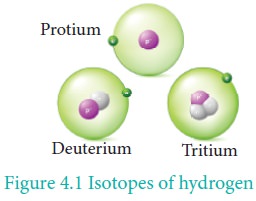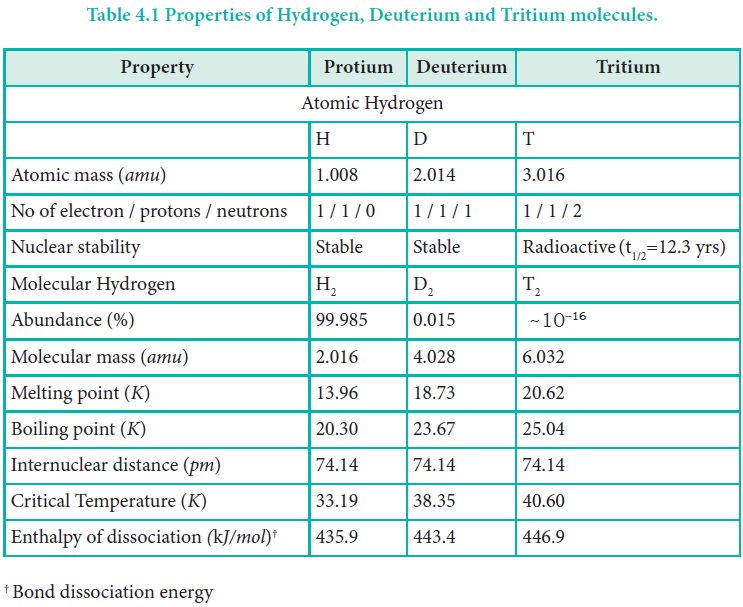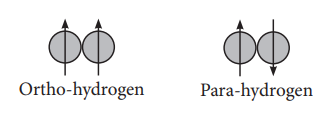Position in Periodic Table, Isotopes, Ortho and Para−Hydrogen | Chemistry - Hydrogen | 11th Chemistry : UNIT 4 : Hydrogen
Chapter: 11th Chemistry : UNIT 4 : Hydrogen
Hydrogen
Hydrogen
Hydrogen, third most abundant on the surface of the
Universe, is being visualised as the major feature source of energy
Introduction
Hydrogen is the simplest atom which contains one electron
and one proton. In contrast to other elements (except helium) its valence
electron is directly in the sphere of action of the nucleus. It is invariably
present in most of the compounds we come across in our daily life such as
water, carbohydrate, proteins etc. As it has an unpaired electron, it is
reactive and exists as a diatomic molecule (H2). However, the
abundance of hydrogen gas in the earth’s atmosphere is very small.
Position in Periodic Table
The hydrogen has the electronic configuration of 1s1
which resembles with ns1 general valence shell configuration of
alkali metals and shows similarity with them as follows:
1. It forms unipositive ion (H+) like alkali
metals (Na+, K+, Cs+)
2. It forms halides (HX), oxides (H2O),
peroxides (H2O2) and sulphides (H2S) like
alkali metals (NaX, Na2O, Na2O2, Na2S)
3. It also acts as a reducing agent.
However, unlike alkali metals which have ionization energy
ranging from 377 to 520 kJ mol-1, the hydrogen has 1,314 kJ mol-1
which is much higher than alkali metals.
Like the formation of halides (X-) from
halogens, hydrogen also has a tendency to gain one electron to form hydride ion
(H-) whose electronic configuration is similar to the noble gas,
helium. However, the electron affinity of hydrogen is much less than that of
halogen atoms. Hence, the tendency of hydrogen to form hydride ion is low
compared to that of halogens to form the halide ions as evident from the
following reactions:
½ H2 + e- → H- ∆H = +36 kcal mol-1
½ Br2 + e- → Br- ∆H = -55 kcal mol-1
Since, hydrogen has similarities with alkali metals as
well as the halogens; it is difficult to find the right position in the periodic
table. However, in most of its compounds hydrogen exists in +1 oxidation state.
Therefore, it is reasonable to place the hydrogen in group 1 along with alkali
metals as shown in the latest periodic table published by IUPAC.
Isotopes of Hydrogen
Hydrogen has three naturally occurring isotopes, viz.,
protium (1H1 or H), deuterium (1H2
or D) and tritium (1H3 or T). Protium (1H1)
is the predominant form (99.985 %) and it is the only isotope that does not
contain a neutron.

Deuterium, also known as heavy hydrogen, constitutes about
0.015 %. The third isotope, tritium is a radioactive isotope of hydrogen which
occurs only in traces (~1 atom per 1018 hydrogen atoms). Due to the
existence of these isotopes naturally occurring hydrogen exists as H2,
HD, D2, HT, T2, and DT. The properties of these isotopes
are shown in Table 4.1.
Table 4.1 Properties of Hydrogen,
Deuterium and Tritium molecules.

Ortho− and Para−Hydrogen:
In the hydrogen atom, the nucleus has a spin. When
molecular hydrogen is formed, the spins of two hydrogen nuclei can be in the
same direction or in the opposite direction as shown in the figure. These two
forms of hydrogen molecules are called ortho
and para hydrogens respectively.

At room temperature, normal hydrogen consists of about 75%
ortho-form and 25% para-form. As the ortho-form is more stable than para-form,
the conversion of one isomer into the other is a slow process. However, the
equilibrium shifts in favour of para hydrogen when the temperature is lowered.
The para-form can be catalytically transformed into ortho-form using platinum
or iron. Alternatively, it can also be converted by passing an electric discharge,
heating above 800°C and mixing with paramagnetic molecules
such as O2, NO, NO2 or with nascent/atomic hydrogen.
Ortho and para hydrogen are similar in chemical properties
but differ in some of the physical properties. For example, the melting point
of para hydrogen is 13.83 K while that of ortho-H2 13.95 K; boiling
point of para hydrogen is 20.26 K while that of ortho hydrogen 20.39 K. Since
the nuclear spins are in opposite directions the magnetic moment of para
hydrogen is zero and ortho hydrogen has magnetic moment twice that of a proton.
Related Topics